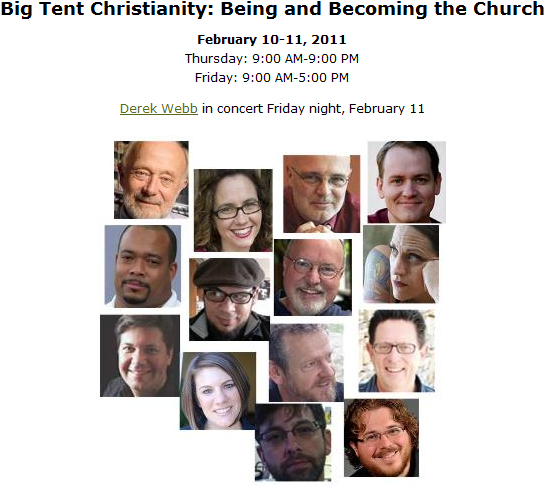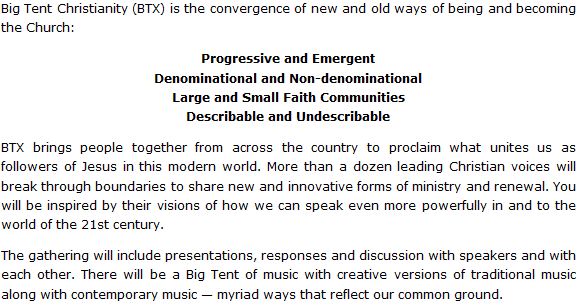BIG TENT CIRCUS OF POSTMODERN LIBERALISM
By Ken Silva pastor-teacher on Jan 26, 2011 in AM Missives, Brian McLaren, Current Issues, Emergence Christianity, Emergent Church, Features
 These things you have done, and I have been silent; you thought that I was one like yourself. But now I rebuke you and lay the charge before you. (Psalm 50:21)
These things you have done, and I have been silent; you thought that I was one like yourself. But now I rebuke you and lay the charge before you. (Psalm 50:21)
Men Said, “Let Us Make God In Our Image.”
Some people just don’t get it. Apprising Ministries has been making you aware of the now upgraded Emerging Church 2.0 with its newer, more clearly delineated, postmodern Progressive Christian theology—a Liberalism 2.0—that this sinfully ecumenical neo-liberal cult of the Emergent Church often refers to as “big tent” Emergence Christianity.
Now this cult is completely out of the closet regarding the soteriology of their new version of liberal theology: Pagan universalism. Even as we speak these rebels against the final authority of God’s Word are furiously building an updated version of the mush god of mysticism with a man-shaped hole in his/her/its heart. This is all a huge part of what Living Spiritual Teacher and EC guru Brian McLaren, one of the unholy Emergent Church trinity of apostates along with universalist Emerging Church pastor Doug Pagitt, and his friend Tony Jones—the progressive “theologian in residence” at Pagitt’s Emergent Solomon’s Porch—began laying out more systematically in his latest book A New Kind of Christianity (ANKoC).
In ANKoC McLaren speaks highly of another of those workers in the basement of the Build-A-God Shop, a progressive/liberal theologian by the name of Harvey Cox of Harvard Divinity fame, whose latest book is called The Future Of Faith. On its back cover McLaren himself gushes:
This important book has not only helped me understand the past, present, future of this amazing phenomenon called Christianity . . . it has also motivated me to keep working to help make actual the possible future Cox envisions
—Brian McLaren, author of A New Kind of Christian
The wise person is going to ask: Just what does this “possible future Cox envisions,” and Brian McLaren is “motivated” to “help make actual,” look like? Well, Lord willing, I’ll be showing you more and more aspects concerning this new form of postmodern liberalism in days to come; here we’re concerned with the mystic mush god they’ve ordered up from the ol’ Build-A-God Shop.
I’ve already shown you in Stranger And Stranger Global Bedfellows Emerging that the endorsements for Harvey Cox’ vision are rather revealing as to where we’re heading—into a Global religion:
The Future of Faith is insightful, provocative, and inspiring—I found myself uttering a hearty evangelical ‘Amen’ at many points!
—Richard Mouw, president of Fuller Theological Seminary and author of Calvinism in the Las Vegas Airport
The Future of Faith is a tour de force. As passionate and challenging as his classic, The Secular City, Cox’s new book invites the faithful, the skeptical, and the fearful intp a spirit-filled version of Christianity that can renew a hurting world.
—Diana Butler Bass, author of A People’s History of ChristianityCox brings the eye of an historian and the heart of a theologian to explain where we’ve come from and where we’re going. The Future of Faith is an essential guide to that future.
—Jim Wallis, president of Sojourners and author of The Great AwakeningHarvey Cox has been a voice of both reason and faith in our cynical times. Now, he offers a fresh vision for the resurrection of a new global Christianity that will restore our faith both in ourselves and in the divine.
—Deepak Chopra, author of Jesus: A Story of Enlightenment [1]
Let me remind you of something I previously pointed out in Seducing Spirits Sounding The Same, while putting this into its proper perspective; when a pantheist proponent of New Spirituality—once known as the New Age Movement—like Deepak Chopra can sign on to your “big tent” supposed “resurrection of a new global Christianity,” then it’s safe to say that you’ve officially departed from anything even remotely resembling the historic, orthodox, Christian faith.
This now bring us to the upcoming EC Big Tent Christianity (BTC) conference pushing their postmodern version of Liberalism 2.0, which I told you about in Big Tent Postmodern Liberal Christianity:
The BTC website tells us it’s about:
We’re told that the keynote speakers will be little known pastrix Carol Merritt, along with some names quite familiar to you here at AM, with the aformentioned EC guru Brian McLaren; then there’s also uber-liberal Living Spiritual Teacher and “Progessive Christian” scholar Marcus Borg, Living Spiritual Teacher and apostate Roman Catholic mystic Richard Rohr, as well as Shane Hipps—co-teaching pastor along with EC rock star icon Rob Bell at the infamous social club Mars Hill Bible Church. Also among those who’ll be involved with this bad dream next month will be Dr. Philip Clayton of the Claremont School of Theology; Clayton’s side-kick from the Transforming Theology network Tripp Fuller, universalist Spencer Burke and “queer inclusive” ELCA “pastor” Nadia Bolz-Weber.
Another time I should have more on this; but in closing this for now, let’s note we’re told that this particular collection of performers under our big top will allegedly “proclaim what unites us as followers of Jesus in this modern world.” Supposedly more than “a dozen leading Christian voices will break through boundaries to share new and innovative forms of ministry and renewal.” Really; leading Christian voices? Leaving aside the others I just mentioned, some of whom don’t really show enough evidence to have them be convicted as being Christian, but Marcus Borg? Only in the postmodern Wonderland of Humpty Dumpty language, where words don’t retain their actual meanings, could Borg even remotely be considered a Christian—let alone a leading Christian voice.
Consider that at his website A Portrait of Jesus, as a so-called Progressive Christian, Jesus Seminar Fellow Marcus Borg describes the “Jesus” he thinks knows. Borg begins by denying Who Jesus Himself claimed to be:
The titles of Jesus (son of God, messiah, light of the world, etc.) are not found in the earliest layer of tradition and are not part of self proclamation of Jesus. (Online source)
This is because Borg sets up a false dichotomy between what he calls “pre-Easter” and “post-Easter” Jesus where pre is said to be a, “Corporeal, human being of flesh and blood” and, “Finite and mortal,” while post is said to be, “Spiritual, non-material reality,” as well as, “Infinite, eternal.” Since it’s beyond the scope of this particular piece to present an apologetic against such lies; suffice to say that anyone reading the Gospels without the “lens” of destructive higher criticism hatched by modern i.e. liberal scholarship will see that Jesus is presented as all of these things prior to His crucifixion.
Far from an invention of the Church, Christ Jesus Himself taught that He was God in human flesh, which largely contributed to getting Him crucified in the first place. However, to understand Marcus Borg et al you need to see that for him Jesus was simply a, “Spirit person.” Borg, whose work is even recommended by EC icon Rob Bell, informs us, “A Spirit person or religious ecstatic is one who has frequent and vivid experiences of the sacred.” And for Borg there have been, and are, “Spirit persons in many cultures.” He further tells us about these persons:
Spirit persons:
* Experience the sacred frequently and vividly
* Become mediators of the sacred, a conduit for the power or wisdom of God to enter this world (Online source)
So now we have a tacit denial by Marcus Borg that Christ Jesus of Nazareth was the monogenes—totally unique—Son of God; as in God incarnate in human flesh. You see, Borg’s “Jesus” is just another, “Spirit person” in the contemplative/mystic traditions found in virtually every other religion; which gives you your key to understanding the pagan universalism, which is where leaders in the Emerging Church will inevitably end up with their interfaith/interspiritual dialogues:
Jesus as Mystic / Spirit Person
There is something about people who are in touch with the sacred that can be felt by those around them; it evokes awe and amazement and impresses people with the feeling of another world.
Such was true of Jesus… The cumulative impression created by the stories in Matthew, Mark, and Luke is that Jesus stands in the Jewish tradition of spirit persons.
Jesus is portrayed as a person through whom the power of the Spirit flowed. (Online source)
Then Borg reveals to us the corrupt source from which he’s formed his life thus far of, in my opinion, always learning but never [being] able to acknowledge the truth (cf. 2 Timothy 3:7):
Seminary also introduced me to the historical study of Jesus and Christian origins. I learned from my professors and the readings they assigned that Jesus almost certainly was not born of a virgin, did not think of himself as the Son of God, and did not see his purpose as dying for the sins of the world… I also found the claim that Jesus and Christianity were the only way of salvation to be troublesome.[1]
Indeed, I don’t doubt these man-pleasers would see this Truth as troublesome; and then finally we consider Borg’s testimony from the interspiritual website Explore Faith where he’s on the Editorial Board along with Phyllis Tickle, the Empress of Emergence Christianity. Here we encounter another very serious problem:
To be Christian means to find the decisive revelation of God in Jesus. To be Muslim means to find the decisive revelation of God in the Koran.
To be Jewish means to find the decisive revelation of God in the Torah, and so forth. I don’t think that one of these is better than the other. You could even say they are all divinely given paths to the sacred. To be Christian in this kind of context means to be deeply committed to one’s own tradition, even as one recognizes the validity of other traditions. (Online source, emphasis in original)
A nice sentiment from Marcus Borg, but not a Christian view; and taken along with his denial of the Deity of Jesus Christ, I find myself asking: Can you actually be a Christian when you don’t even believe what Christians believe? Jesus Himself said to Jewish religious leaders—men every bit as pious as Marcus Borg may be — “I said therefore to you that you will die in the sins of you; for if you believe not that I Am [the eternal God], you will die in the sins of you” (John 8:24, literal Greek).
Sadly, because of this big tent circus and men like Marcus Borg, we’ll now need to remember that years ago in his classic textbook The Kingdom of the Cults Dr. Walter Martin (1928-1989) spoke of the importance of scaling the language barrier because:
The well-trained cultist will carefully avoid definition of terms concerning cardinal doctrines such as the Trinity, the deity of Christ, the Atonement, the bodily resurrection of our Lord, the process of salvation by grace and justification by faith. If pressed in these areas, he will redefine the terms to fit the semantic framework of orthodoxy unless he is forced to define his terms explicitly.[2]
The Good News of Christ Jesus is repentance and forgiveness of sins in His Name; in other words, the regenerated believer will not die in his sins. But Marcus Borg, by his own admission, does not believe Jesus is God in human flesh i.e. very God of very God; so by definition then, 1) this is a different Jesus (see—2 Corinthians11:4), and 2) Dr. Borg is in danger of dying in his sins. Therefore, if we love Marcus Borg, we won’t let him deceive himself into thinking he’s a Christian; no instead, we’ll pray for his repentance and preach the Gospel to him.
________________________________________________________________________________
Endnotes:
[1] Marcus Borg, The God We Never Knew: Beyond Dogmatic Religion To A More Authenthic Contemporary Faith [San Francisco: HarperOne, 1997], 25, emphasis mine.
[2] Walter Martin, The Kingdom of the Cults, Ravi Zacharias, Gen. Ed. [Minneapolis: Bethany House, 2005], 33.
See also:
BIG TENT POSTMODERN LIBERAL CHRISTIANITY
BIG TENT PROGRESSIVE CHRISTIANITY AS LIBERALISM 2.0
LIBERALISM 2.0 THE NEW PROGRESSIVE CHRISTIAN
BRIAN MCLAREN AND HIS NEW EMERGING PROGRESSIVE THEOLOGY
THE EMERGING CHURCH, PHILIP CLAYTON, AND NEW PROGRESSIVE THEOLOGY
THE EMERGING CHURCH AND THE NEW PROGRESSIVE THEOLOGY ON OTHER RELIGIONS
THE EMERGING CHURCH AND THE NEW PROGRESSIVE THEOLOGY ON CHRIST

